updated 7:41 PM EDT, Tue June 19, 2012
STORY HIGHLIGHTS
- A general and Mubarak's lawyer say he is not dead
- State-run Middle East News Agency, citing medical sources, says he's dead
- Mubarak's attorney: "He has suffered a stroke but he is not dead"
The state-run Middle East News Agency, citing medical sources, said he was declared clinically dead shortly after arriving late Tuesday at a military hospital in Cairo, where he had been taken after suffering a stroke and cardiac arrest earlier in the day.
But Gen. Mamdouh Shaheen, a member of the Supreme Council of the Armed Forces, told CNN, "He is not clinically dead as reported, but his health is deteriorating and he is in critical condition."
Mubarak was taken by helicopter to the military hospital in the Maadi suburb of Cairo, Shaheen said. "He had a heart attack and his heart stopped and he was saved by electric shocks, then placed on respirator," he said. "His pulse is 40. He then got a brain clot. He is NOT clinically dead as reported but his health is deteriorating and he is in critical condition."
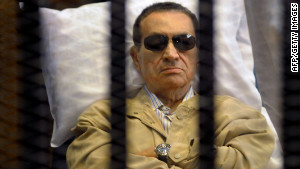 Report: Mubarak in critical condition
Report: Mubarak in critical condition 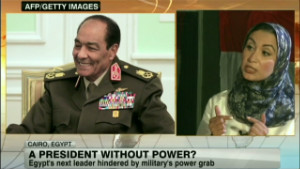 The legacy of the Egyptian revolution
The legacy of the Egyptian revolution  Egypt leadership in limbo
Egypt leadership in limbo And Mubarak's lawyer, Fareed El Deeb, told CNN, "He has been in a coma for hours now. He has had water on the lungs for 10 days now and his blood pressure is down today, which obstructed his breathing and forced doctors to put him on a respirator. He was given medicine intravenously to relieve the brain clot, and electric shocks were used to revive him but there was no substantial response. He is not dead as reported."
Adel Saeed, the official spokesman of the Egyptian prosecutor, had said earlier, "We were informed by prison authority that Mubarak's heart has stopped and they used electric shocks and CPR to resurrect him. He is now on an artificial respirator and doctors from the armed forces and International Medical Center will inspect him."
Nile TV reported that Mubarak had suffered a stroke.
He was taken from Tora prison hospital to Maadi military hospital, El Deeb told CNN. "He has suffered a stroke, but he is not dead."
The prosecutor and the military council denied Mubarak had been moved.
His health had been reported in decline since he was ousted as president of Egypt in February 2011 and found guilty of charges related to the killings of hundreds of anti-government demonstrators during the revolution.
Last week, an Interior Ministry spokesman said he was comatose; the spokesman said he suffered from high blood pressure, irregular heartbeats and difficulty breathing.
"We should be skeptical," said Fouad Ajami, a senior fellow at Stanford University's Hoover Institution.
"There's a great Arab expression I like and it asks the following question: When you're told that someone is dead, you say, 'Is he dead and buried, or just dead?' I think we are in the middle of this kind of situation."
"Clinically dead is not a phrase that is commonly used, but when it is used, what it usually means is that someone is brain dead," said CNN Senior Medical Correspondent Elizabeth Cohen. "In the United States, we would call this person dead because they have no brain activity."
Meanwhile, crowds jammed Tahrir Square once again on Wednesday. But their focus this time was not on Mubarak. Instead, it was on the power grab by the Egyptian military, which last week issued a constitutional decree that stripped the position of president of much of its power after a top court dissolved the parliament. Those moves were followed by the nation's first presidential election, which pitted Muslim Brotherhood candidate Mohammed Morsi against Mubarak's former prime minister, Ahmed Safik. Final results have not been announced.
"It's a media stunt to divert attention from the constitutional decree," said Taha Shaker, a demonstrator in the square. "If he's really dead, it won't make a difference. We've started a sit-in and won't leave unless the Supreme Council of the Armed Forces leaves unconditionally."
"I've come from far away. I'm not leaving until Morsi swears the oath in front of the legitimately elected parliament," said demonstrator Sayed Ahmed. "I don't care about Mubarak. These are games played by the intelligence services."
"If he's really dead, its God's will," said Nasser Shaaban, another demonstrator. "I would hope he lives to see the new president."
Outside Maadi Military Hospital, shortly before midnight Tuesday, there was no additional security. Instead, there were a few policemen outside the main gate and two military police inside the gate. Across the street perhaps a half-dozen journalists sat on the curb smoking cigarettes.
Have you witnessed demonstrations in the Arab world? Tell us what you see.
Follow coverage on CNN Arabic
You have read this article with the title EGYPT BREAKING NEWS: Conflicting reports about whether Mubarak has died, declared "clinically dead". You can bookmark this page URL http://meingeilesich.blogspot.com/2012/06/egypt-breaking-news-conflicting-reports.html. Thanks!

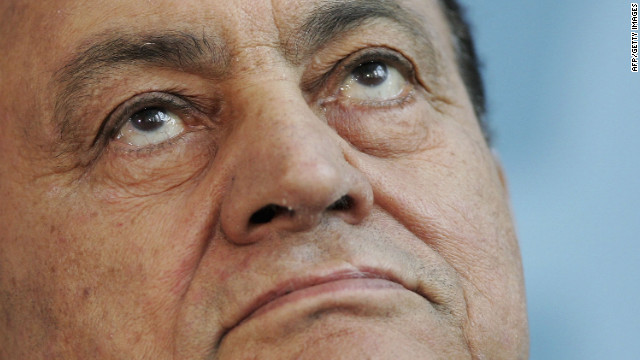 Former Egyptian President Hosni Mubarak, 84, is declared clinically dead on Tuesday, June 19, shortly after arriving at a military hospital in Cairo, according to Egypt's state-run news agency. A military official disputes the report and says Mubarak is in critical condition.
Former Egyptian President Hosni Mubarak, 84, is declared clinically dead on Tuesday, June 19, shortly after arriving at a military hospital in Cairo, according to Egypt's state-run news agency. A military official disputes the report and says Mubarak is in critical condition. 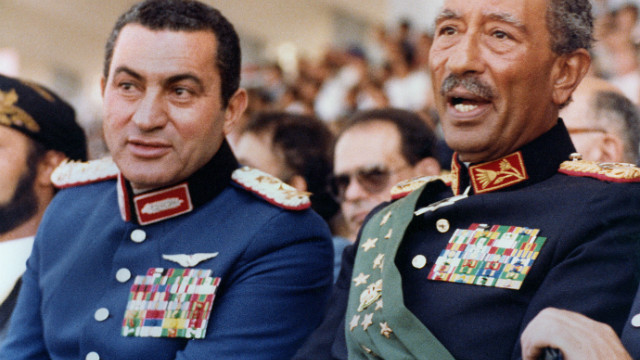 Then-Vice President Mubarak, left, joins President Anwar Sadat at a military parade on October 6, 1981, the day Islamic fundamentalists from within the army assassinated Sadat. Mubarak succeeded Sadat as Egypt's president, maintaining power for nearly three decades.
Then-Vice President Mubarak, left, joins President Anwar Sadat at a military parade on October 6, 1981, the day Islamic fundamentalists from within the army assassinated Sadat. Mubarak succeeded Sadat as Egypt's president, maintaining power for nearly three decades. 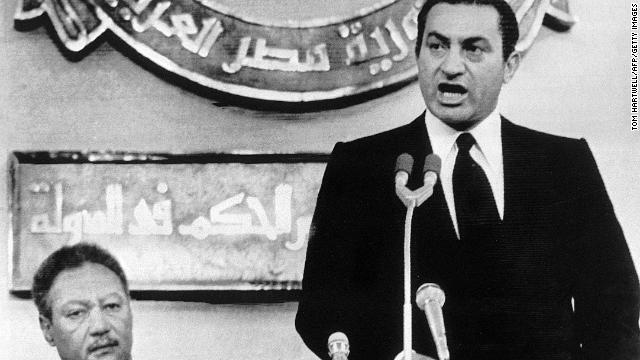 Eight days after Sadat's assassination, Mubarak is officially sworn in as Egypt's president on October 14, 1981. Mubarak was re-elected in 1987, 1993, 1999 and 2005.
Eight days after Sadat's assassination, Mubarak is officially sworn in as Egypt's president on October 14, 1981. Mubarak was re-elected in 1987, 1993, 1999 and 2005. 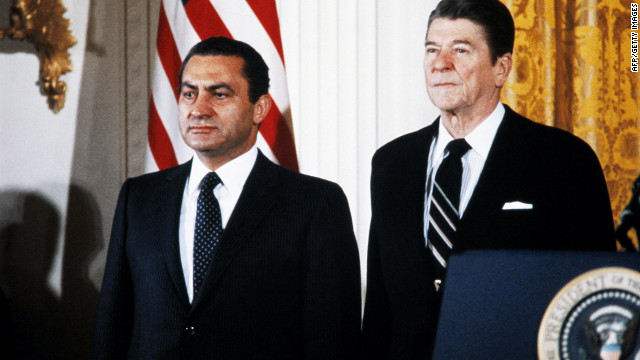 Mubarak poses with U.S. President Ronald Reagan at the White House in 1982.
Mubarak poses with U.S. President Ronald Reagan at the White House in 1982. 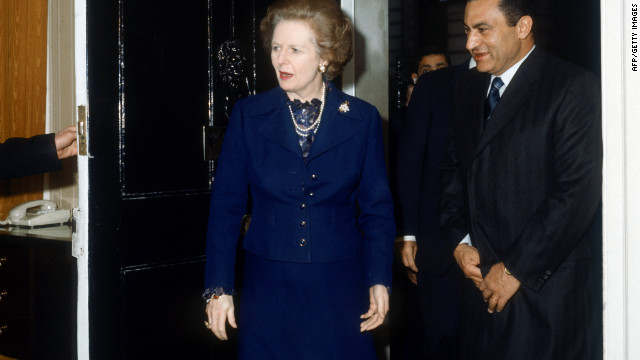 British Prime Minister Margaret Thatcher meets with Mubarak in London in 1985.
British Prime Minister Margaret Thatcher meets with Mubarak in London in 1985. 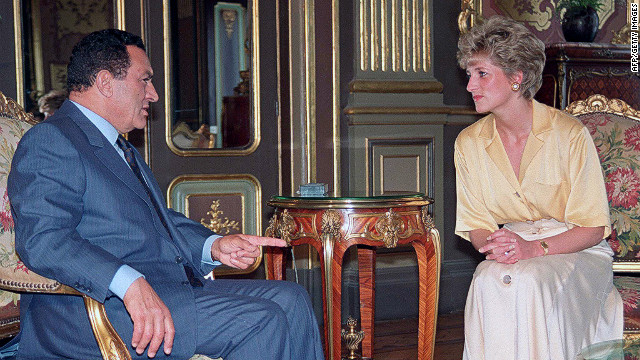 Diana, Princess of Wales, visits Mubarak in 1992 during a trip to Egypt.
Diana, Princess of Wales, visits Mubarak in 1992 during a trip to Egypt. 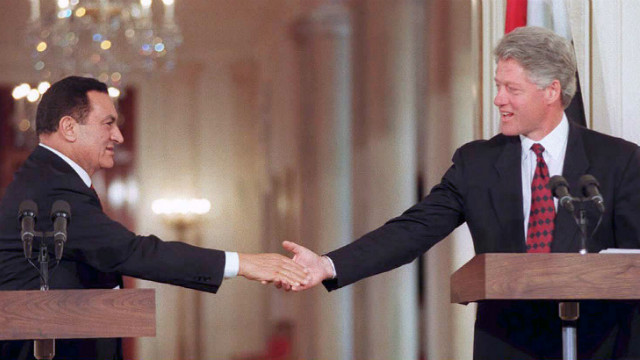 Mubarak and U.S. President Bill Clinton hold a joint press conference in 1995.
Mubarak and U.S. President Bill Clinton hold a joint press conference in 1995. 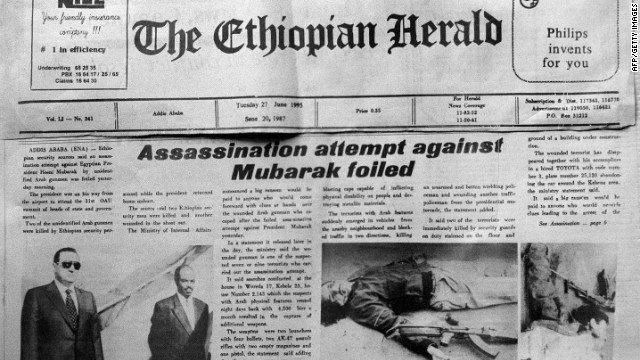 The front page of the Ethiopian Herald reports a foiled assassination attempt on Egypt's president on June 27, 1995. Mubarak survived an attempt by an al Qaeda-affiliated group in Addis Ababa, Ethiopia.
The front page of the Ethiopian Herald reports a foiled assassination attempt on Egypt's president on June 27, 1995. Mubarak survived an attempt by an al Qaeda-affiliated group in Addis Ababa, Ethiopia. 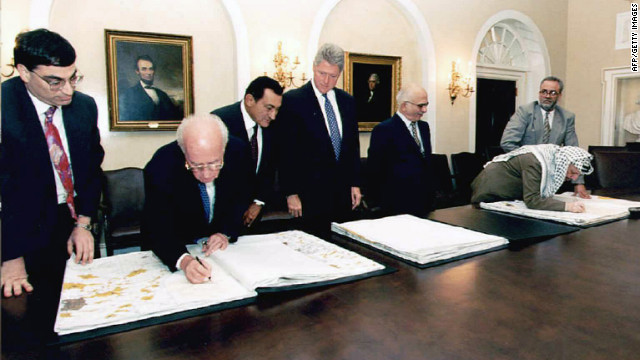 Mubarak, third from left, joins President Bill Clinton, Israeli Prime Minister Yitzhak Rabin, second from left, Jordan's King Hussein, third from right, and Palestinian leader Yasser Arafat, second from right, in Washington in 1995. The Israeli leader and Arafat signed maps representing the redeployment of Israeli troops in the West Bank.
Mubarak, third from left, joins President Bill Clinton, Israeli Prime Minister Yitzhak Rabin, second from left, Jordan's King Hussein, third from right, and Palestinian leader Yasser Arafat, second from right, in Washington in 1995. The Israeli leader and Arafat signed maps representing the redeployment of Israeli troops in the West Bank. 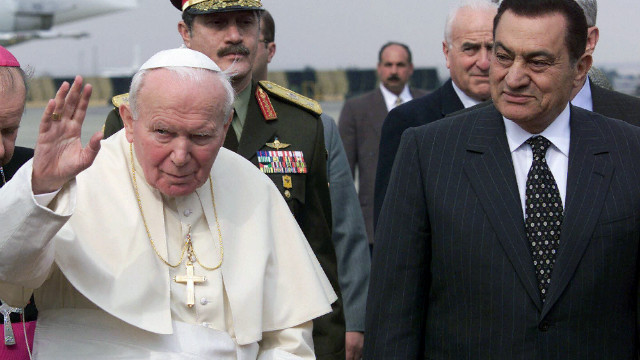 Mubarak welcomes Pope John Paul II to Egypt for a three-day visit in 2000.
Mubarak welcomes Pope John Paul II to Egypt for a three-day visit in 2000. 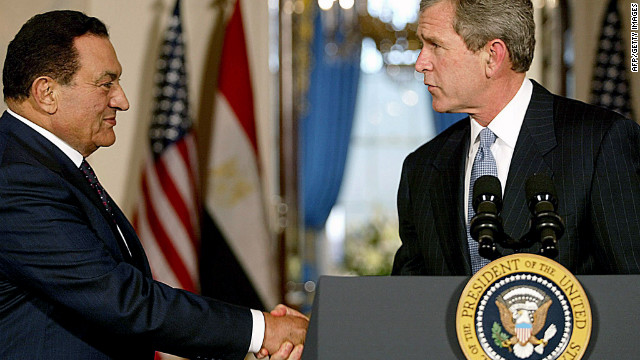 U.S. President George W. Bush greets Mubarak at the White House in 2002 to talk about the Middle East crisis and the war in Afghanistan.
U.S. President George W. Bush greets Mubarak at the White House in 2002 to talk about the Middle East crisis and the war in Afghanistan. 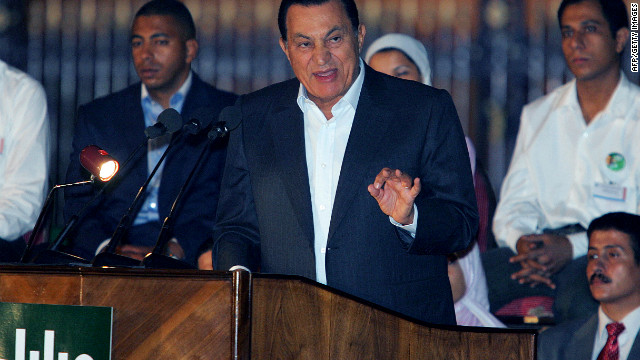 In 2005, Mubarak again runs for a six-year term in the country's first multiparty presidential election. He was declared the official winner with about 88% of the vote, but many considered the election to be a sham.
In 2005, Mubarak again runs for a six-year term in the country's first multiparty presidential election. He was declared the official winner with about 88% of the vote, but many considered the election to be a sham. 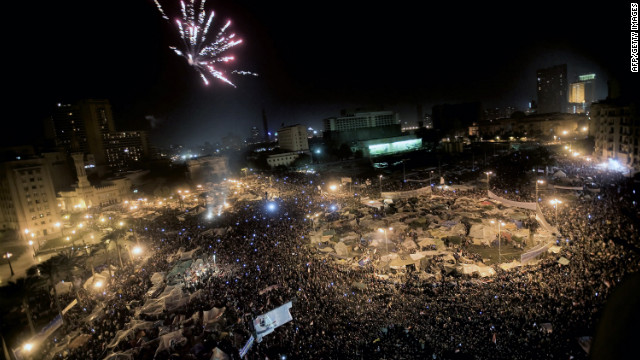 After weeks of Egyptians protesting Mubarak's 29-year reign, the president steps down from office on February 11, 2011, causing celebrations in Cairo's Tahrir Square.
After weeks of Egyptians protesting Mubarak's 29-year reign, the president steps down from office on February 11, 2011, causing celebrations in Cairo's Tahrir Square. 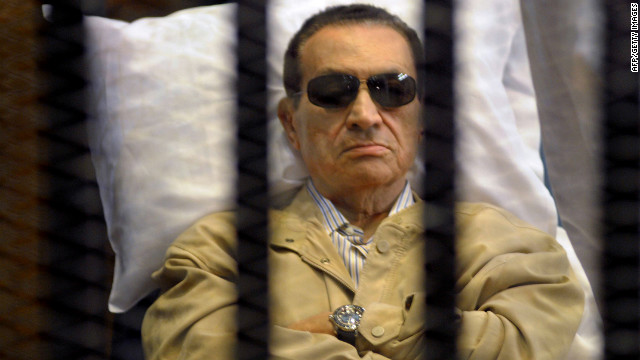 The ousted leader lies in a medical bed inside a cage in a courtroom during his verdict hearing in Cairo on June 2, 2012. A judge sentenced Mubarak to life in prison for his role in ordering the killing of protesters in the 2011 uprisings.
The ousted leader lies in a medical bed inside a cage in a courtroom during his verdict hearing in Cairo on June 2, 2012. A judge sentenced Mubarak to life in prison for his role in ordering the killing of protesters in the 2011 uprisings. 



















